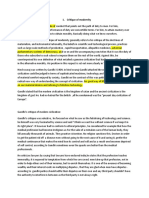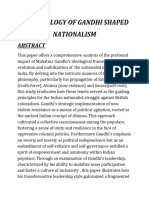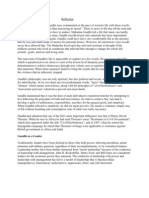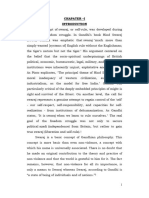Gandhiji Philosophy
Gandhiji Philosophy
Uploaded by
Sania SiddiquiCopyright:
Available Formats
Gandhiji Philosophy
Gandhiji Philosophy
Uploaded by
Sania SiddiquiCopyright
Available Formats
Share this document
Did you find this document useful?
Is this content inappropriate?
Copyright:
Available Formats
Gandhiji Philosophy
Gandhiji Philosophy
Uploaded by
Sania SiddiquiCopyright:
Available Formats
Notable Works
An Autobiography: The Story of My Experiments with Truth;
The Collected Works of Mahatma Gandhi
Panchayati Raj
Satyagraha in South Africa,
Sarvodaya and
Hind Swaraj
He edited Young India which he later renamed as Harijan which remained his
mouthpiece.
Influence
Gandhiji was also influenced by many:
Tolstoy (Gospels in Brief; What to Do, The Kingdom of God is Within You),
Ruskin (Unto This Lost).
Thoreau (Essoy on Civil Disobedierrce).
Swami Vivekananda, Gokhale and Tilak
UNITY OF ENDS AND MEANS and Duty
That the ends and means are related to each other is one of the basic tenets of
Gandhian philosophy. Gandhiji would not like to attain the noblest end if that was to
be achieved through impure means.
For him, "Impure means result in impure end. One cannot; reach truth by
untruthfulness. Truthful conduct alone can reach Truth".
Atmasakti and Duty: Inspired by the Gita, the ethical principle that he upheld was
atmasakti. One does not perform his duty expecting the fruit of his action and does it
for the sake of duty.
SATYA. SATYAGRAHA AND AHIMSA
Satya and Knowledge
Truth or Satya, for Gandhiji, is God himself. He therefore changed the statement,
"God is Truth", later in his life into, "Truth is God" and suggested that it was one of
the fundamental discoveries of his life's experiments.
He was convinced that knowledge alone" leads a person to the truth while ignorance
takes one away from the truth.
Satyagraha
Satyagraha means urge for Satya, or truth,
Satyagraha is not merely the insistence on truth; it is, in fact, holding on to truth
through ways which are moral and non-violent.
It is not coercion but is persuasion.It is not the imposition of one's will over others,
but it is appealing to the reasoning of the opponent,
Attributes of Satyagraha
It is a moral weapon and non-violent device and does not entertain ill feeling towards
the adversary,
it does not weaken the opponent but strengthens him morally;
it is a weapon of the brave and is constructive in its approach
Ahimsa
Truth, he firmly believed, can be attained only through non-violence.
In its positive sense, non-violence means love for others; in its negative sense, it seeks no
injury to others, both in words as well as deeds. Gandhiji talked of non-violence of different
people. There is the non-violence of the brave one has the force but he does not use it as a
principle; there is the non- violence of the weak one does not have faith in non-violence,
but he uses it for attaining his objectives, there is the nonviolence of the coward: it is not
non-violence, but impotency, more harmful than violence. For Gandhij, violence was a
better option than cowardice.
Given the enmeshing of means and ends, Gandhiji, often saw Love, Truth, God and Non-
violence as interchangeable terms.
SARVODAVA: THE RISE OF ALL
Gandhiji was critical of the path both capitalist and socialist economies had taken
Criticism of Capitalism Concentration of Wealth
America is the most industrialised country in the world, and yet it has not banished
poverty and degradation as it concentrates power in the hands of the few who amass
fortunes at the expense of the many.
Criticism of Socialism: Deeply enmeshed in violence and focus on material progress and
no freedom
While he looked at socialism positively, he felt that it was deeply enmeshed in
violence.
Further, socialism has only one aim that is material progress.
Under the other socialism, these is no individual freedom. You own nothing, not even
your body.
Against capitalism and socialism, Gandhi proposed the concept of Sarvodaya, which was
based on three basic principles:
1. that the good of the individual is contained in the good of all;
2 that the lawyer's work has the same value as the barber's, in as much as all have the
same right of earning their livelihood from their work;
3. that a life of labour, le, the life of the tiller of the soil and the handicraftsman is the life
worth living
CONCEPT OF SWADESHI
Swadeshi is that spirit in us which restricts us to use the services of our immediate
surroundings to the exclusion of the more remote". "Much of the deep poverty of
the masses, be felt, "is due to the ruinous departure from swadeshi in the
economic and industrial life. Swadeshi will not merely reinforce autonomous local
units; promote self-sufficiency but also build cooperative relations with others
with whom they need to associate.
The concept of Swadeshi, for Gandhi, is encompassing in religion, it means to be
faithful to our ancestral religion; in politics, it means the use of indigenous
institutions; in economics, it emphasised on the use of things produced in the
immediate neighbourhood; one must prefer locally produced things even if they
are of relatively inferior quality or costly.
It does not mean that one should hate foreign-made products. Gandhiji had a
place for foreign- made goods, especially medicines and life-saving drugs if they
are not produced in the country.
THEORY OF TRUSTEESHIP
One of the most original contributions of Gandhiji in the area of economics is the
concept of trusteeship.
To ensure that those who were rich did not use their property for selfish purposes or
to control others, he derived the term "Trusteeship".
Explaining the meaning underlying this term he said, 'Everything belonged to God and
was from God. Therefore, it was meant for His people as a whole, not for particular
individuals. When an individual had more than his proportionate portion he became
trustee of that portion for God's people'.
Further:
o All humans are born equal and hence have a right to equal opportunity. This
means that all must have their basic needs fully satisfied.
o All humans, however, are not endowed with equal intellectual and physical
capacity. Some would have greater capacity to produce than others. Such
persons must treat themselves as trustees of the produce beyond their basic
needs.
o Violence and force as modes of distribution of produce have to be rejected.
EVILS OF INDUSTRIALISM
Gandhiji was against industrialisation on a mass scale because it leads to many insoluble
problems such as the exploitation of the villagers, urbanisation, environmental pollution
etc. He wanted manufacturing to be done in villages and by the villages. This would keep
the majority of the people of India fully employed;
He was not against machinery as such, he was against industrialism, I,e: Industrial and
mechanical mentality .
The efforts he made to promote Khadi were just a beginning of the movement he wanted to
launch to promote village industries in general. One must see Gandhiji's concept of basic
education (nai taleem) in relation to his movement for village industries.
You might also like
- Tibetan Kama Sutra 4 Men v3Document9 pagesTibetan Kama Sutra 4 Men v3Craig Barratt100% (1)
- Seminar Report: Sarvodaya Thought of Mahatma GandhiDocument7 pagesSeminar Report: Sarvodaya Thought of Mahatma Gandhisweetcrys3No ratings yet
- PS-II (BLLB-202) Unit-V - (3) - 060408Document31 pagesPS-II (BLLB-202) Unit-V - (3) - 060408Saquib khanNo ratings yet
- Arjun Tanty-4Document24 pagesArjun Tanty-4arjuntanty76No ratings yet
- Gandhian Strategy-The Exclusive Mantra For Solving Problems in Modern Context - Articles On and by GandhiDocument7 pagesGandhian Strategy-The Exclusive Mantra For Solving Problems in Modern Context - Articles On and by Gandhideepak100% (1)
- Answer For Gandhi PaperDocument13 pagesAnswer For Gandhi PaperNeha NegiNo ratings yet
- Heritage2018 14 19 MahatmaGandhiDocument6 pagesHeritage2018 14 19 MahatmaGandhiQueenNo ratings yet
- 7.7 Gandhian EthicsDocument12 pages7.7 Gandhian Ethicsbap18 2115No ratings yet
- MAPhilosophy 13Document7 pagesMAPhilosophy 13ro.hitshaya0224No ratings yet
- Mohandas Karamchand GandhiDocument18 pagesMohandas Karamchand GandhiDevendra DewasthaleNo ratings yet
- Gandhi PLB452 Assignment 2Document7 pagesGandhi PLB452 Assignment 2ABDUL AHAD CHOWDHURYNo ratings yet
- English Assignment - Sidharth - 48 - 20240226 - 215021 - 0000Document6 pagesEnglish Assignment - Sidharth - 48 - 20240226 - 215021 - 0000fortnitestream1001No ratings yet
- Political Science Winter 2020Document8 pagesPolitical Science Winter 2020HeenaNo ratings yet
- Relevance of Gandhian Principles in Contemporary India: HistoryDocument2 pagesRelevance of Gandhian Principles in Contemporary India: HistoryshashankNo ratings yet
- How Ideology of Gandhi Shaped NationalismDocument17 pagesHow Ideology of Gandhi Shaped Nationalismchetalimorwal81No ratings yet
- A Study On Gandhian Philosophy Chapter - 1: Roll No.: 61403U07006Document15 pagesA Study On Gandhian Philosophy Chapter - 1: Roll No.: 61403U07006Subhendu Ghosh100% (1)
- 6 Means EndDocument10 pages6 Means EndShobhit kaptaNo ratings yet
- Vaibhav Civil PresentationDocument5 pagesVaibhav Civil PresentationAmitesh SinghNo ratings yet
- Mahatma GandhiDocument4 pagesMahatma Gandhiadev33462No ratings yet
- Hind Swaraj ReviewDocument4 pagesHind Swaraj Reviewyogendra choukiker0% (1)
- The Gandhian ApproachDocument14 pagesThe Gandhian ApproachDevendrapratapdp0% (1)
- English Assignment - GandhiDocument6 pagesEnglish Assignment - Gandhifortnitestream1001No ratings yet
- SatyagrahaDocument26 pagesSatyagrahaSahajPuriNo ratings yet
- GandhiDocument11 pagesGandhiskyeNo ratings yet
- Gandhi's PhilosophyDocument5 pagesGandhi's Philosophyudaywal.nandiniNo ratings yet
- Manoj GandhiDocument23 pagesManoj GandhiQueenNo ratings yet
- Themes of Indian Political ThoughtsDocument5 pagesThemes of Indian Political ThoughtsCROWN GAMEORADENo ratings yet
- Unit 4 BDocument10 pagesUnit 4 BR20PLP020 Kavya Reddy YNo ratings yet
- Relevance of Gandhism in Todays TimeDocument5 pagesRelevance of Gandhism in Todays TimeJennifer JamesNo ratings yet
- Gandhi - SwarajDocument3 pagesGandhi - SwarajHriday MeghaniNo ratings yet
- Gandhian IdeologyDocument3 pagesGandhian IdeologySaurabh JaiswalNo ratings yet
- Brief Outline of GandhiDocument7 pagesBrief Outline of GandhiakshayaecNo ratings yet
- Thruth and Non ViolenceDocument5 pagesThruth and Non Violencetanishkaverekar.1506No ratings yet
- ReflectionDocument3 pagesReflectionyssumaNo ratings yet
- Gandhi's Satyagraha Anf and The Nature of The StateDocument10 pagesGandhi's Satyagraha Anf and The Nature of The StateHosen AliNo ratings yet
- SATYAGRAHADocument6 pagesSATYAGRAHAZakir HussainNo ratings yet
- Gandhian PrinciplesDocument6 pagesGandhian Principlestweshamishra16No ratings yet
- Relevance of Gandhian Philosophy in Contemporary PeriodDocument12 pagesRelevance of Gandhian Philosophy in Contemporary PeriodJAMESJANUSGENIUS5678100% (1)
- Class - Test - 2 - Politics and NonviolenceDocument8 pagesClass - Test - 2 - Politics and NonviolenceADITYA SONINo ratings yet
- Political ScienceDocument21 pagesPolitical ScienceananyaNo ratings yet
- mgp 004Document61 pagesmgp 004Sri ram charan tejNo ratings yet
- Gandhi's Concept of Nonviolence and PacifismDocument6 pagesGandhi's Concept of Nonviolence and PacifismRaghvendra Singh Khichi100% (1)
- Gandhian Thoughts LeadersDocument34 pagesGandhian Thoughts LeadersVincent WilsonNo ratings yet
- Truth and Non-Violence: The Foundations of Gandhian PhilosophyDocument2 pagesTruth and Non-Violence: The Foundations of Gandhian PhilosophyinventionjournalsNo ratings yet
- Satyagraha and Its Relevance - Gopika.N.G, 1 M.A.EnglishDocument4 pagesSatyagraha and Its Relevance - Gopika.N.G, 1 M.A.EnglishGopika GopalakrishnanNo ratings yet
- Gandhi As A Political Strategist PDFDocument3 pagesGandhi As A Political Strategist PDFIndie BotNo ratings yet
- Main Ideas of Mahatma GandhiDocument18 pagesMain Ideas of Mahatma GandhiAman sengarNo ratings yet
- What Swaraj Meant To Gandhi ArticleDocument13 pagesWhat Swaraj Meant To Gandhi ArticleRomaNo ratings yet
- 06 Chapter 1Document18 pages06 Chapter 1ksukriti16No ratings yet
- Gandhi Religion and Passive ResistanceDocument2 pagesGandhi Religion and Passive ResistanceBrahmankhanda Basapara HIGH SCHOOLNo ratings yet
- Unit 7Document10 pagesUnit 7Princy MaheshwariNo ratings yet
- Mahatma GandhiDocument5 pagesMahatma Gandhiabdul.rahmanprivate.box2022No ratings yet
- Political Science NotesDocument10 pagesPolitical Science NotesSonakshi SinhaNo ratings yet
- Gandhian EconomicsDocument23 pagesGandhian Economicshanumantha raoNo ratings yet
- Gandhian EconomicsDocument5 pagesGandhian Economicsfisher pistolNo ratings yet
- ApproachesDocument22 pagesApproachesrevathisankarNo ratings yet
- Gandhi Today: A Report on India's Gandhi Movement and Its Experiments in Nonviolence and Small Scale Alternatives (25th Anniversary Edition)From EverandGandhi Today: A Report on India's Gandhi Movement and Its Experiments in Nonviolence and Small Scale Alternatives (25th Anniversary Edition)No ratings yet
- City Star Diwali 2022Document32 pagesCity Star Diwali 2022city star newspaperNo ratings yet
- LOC Manifest-2016Document38 pagesLOC Manifest-2016Gregory Bianco100% (1)
- Https - Noahsflood - Com - WP Content - Uploads - 2022 - 01 - The Ark and The Darkness 12 17 21 Low ResDocument197 pagesHttps - Noahsflood - Com - WP Content - Uploads - 2022 - 01 - The Ark and The Darkness 12 17 21 Low ResIgazságNo ratings yet
- Qur'an of The Oppressed: Liberation Theology and Gender Justice in Islam 1st Edition Shadaab Rahemtulla 2024 Scribd DownloadDocument52 pagesQur'an of The Oppressed: Liberation Theology and Gender Justice in Islam 1st Edition Shadaab Rahemtulla 2024 Scribd Downloadkhmisjoulia100% (4)
- Take Me To ChurchDocument2 pagesTake Me To ChurchAlinaNo ratings yet
- Cox Secular City PDFDocument8 pagesCox Secular City PDFMacario TorresNo ratings yet
- Just Before Heaven The Judgment Seat of ChristDocument33 pagesJust Before Heaven The Judgment Seat of ChristaishahNo ratings yet
- Makalah Fiqh Dan Ushul Fiqh (Kelompok 1)Document12 pagesMakalah Fiqh Dan Ushul Fiqh (Kelompok 1)rahmatan islamiNo ratings yet
- Eastern Classics: Seminar Reading List - Fall Week OneDocument4 pagesEastern Classics: Seminar Reading List - Fall Week OneJosh CampfieldNo ratings yet
- EKKLĒSIA IN MATTHEW - EditedDocument2 pagesEKKLĒSIA IN MATTHEW - EditedRuatsanga Chhakchhuak L A R S 04No ratings yet
- Guru GeetaDocument31 pagesGuru GeetaJag VrNo ratings yet
- ADFEC ProfileDocument8 pagesADFEC ProfileMohammed NasserNo ratings yet
- Proposal MaulidDocument11 pagesProposal MaulidMuhammad Ahlam DzulkarnaenNo ratings yet
- Marital Harmony GuideDocument40 pagesMarital Harmony Guidemind blocNo ratings yet
- The Qur'an and The Common Law Islamic Law Reform and The Theory of Legal ChangeDocument62 pagesThe Qur'an and The Common Law Islamic Law Reform and The Theory of Legal ChangeHigh WayNo ratings yet
- PhilosophyDocument4 pagesPhilosophyblabla blablaNo ratings yet
- Act 3 Scene 3 4 5Document4 pagesAct 3 Scene 3 4 5Ishaan Agarwal100% (1)
- Topic: Heritage Walk of Amritsar: Submitted To: Ms Aseesdeep KourDocument4 pagesTopic: Heritage Walk of Amritsar: Submitted To: Ms Aseesdeep Kourhimanshu jainNo ratings yet
- Topology of STUPA Borobudur Indian and SDocument80 pagesTopology of STUPA Borobudur Indian and SUday DokrasNo ratings yet
- Chapter 02 Lesson 01 - Osorio, CDocument27 pagesChapter 02 Lesson 01 - Osorio, CDEBORAH JUBILEE MABAYAGNo ratings yet
- Review of VaninaDocument36 pagesReview of VaninaNajaf HaiderNo ratings yet
- The Preservation of HadithDocument58 pagesThe Preservation of HadithHassan ShiblyNo ratings yet
- Blogtask 1Document2 pagesBlogtask 1api-340762699No ratings yet
- Short Sadhana of Peaceful and Wrathful Deities From The Cycle of Karling ShitroDocument2 pagesShort Sadhana of Peaceful and Wrathful Deities From The Cycle of Karling ShitroTrang NguyenNo ratings yet
- Theory Is An Explanation Given To Explain Certain RealitiesDocument7 pagesTheory Is An Explanation Given To Explain Certain Realitiestaizya cNo ratings yet
- ALL SongsDocument11 pagesALL SongsAvnish Chandra SumanNo ratings yet
- Ethics Notes Lesson 1 and 2Document2 pagesEthics Notes Lesson 1 and 2butterfly C. PaNo ratings yet
- TH e Origins of Sventovit of Rügen: Roman ZaroffDocument10 pagesTH e Origins of Sventovit of Rügen: Roman ZaroffSTNo ratings yet
- Struktur Organisasi Update Bma Site HBBDocument3 pagesStruktur Organisasi Update Bma Site HBBadedwi.kurniawan17No ratings yet

























































































